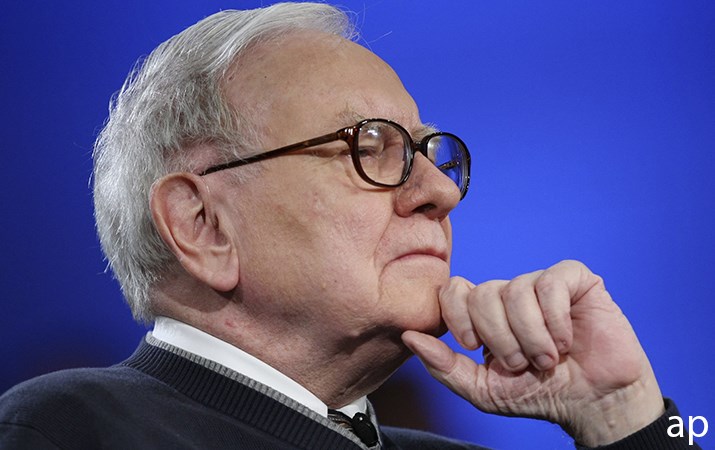
Few investors would question the wisdom of the Sage of Omaha Warren Buffett, but James Anderson, manager of the Scottish Mortgage investment trust (SMT), has challenged investors “blind conviction” that value strategies will come back into fashion. With a portfolio stuffed full of growth stocks, many investors may have expected the trust to suffer in bear market conditions, but its annual results show it has been resilient in the latest rout.
Anderson said investors had failed to appreciate “the clear evidence of the power of the internet, the increasing returns to scale it tends towards and the consequent deep competitive moats it offers”. He added: “Instead of embracing exponential growth, investors and asset allocators have fled.”
He said Warren Buffett’s “extraordinary grip” was partly to blame for many investors missing out on the inexorable rise of many of Anderson’s favourite growth stocks. Anderson said a strategy of rebalancing towards value in the hope it would outperform was “an investment tragedy”.
Anderson added: “As Buffett’s brilliant partner, Charlie Munger, puts it with the clarity of a 96-year-old. Too many investors are ‘like a bunch of cod fishermen after all the cod’s been overfished … that’s what happened to all these value investors. Maybe they should move to where the fish are’.”
Investing for Growth
Anderson is famed for his growth style of investing and for taking big stakes in tech stocks. (AMZN) is the trust’s largest holding, accounting for 9.3% of its £10 billion of assets, followed by Tesla (TSLA) and Alibaba (BABA), making up 8.63% and 6.5% of the portfolio respectively. Netflix (NFLX), also among the trust’s top 10 positions, has enjoyed an unprecedented boom in user numbers during lockdown.
It’s a strategy that has delivered annualised returns of 20.6% to investors over the past decade, and a return of 31.75% over the past year alone. And investors who thought such a growth strategy would suffer in the recent rout, they were wrong: the trust, which has Morningstar Analyst Rating of Gold, is up 5.88% over the past three months, according to Morningstar data. Analysts say that while the fund is not for the risk-averse, it could be a good options for “long-term investors seeking exposure to the potential winners of tomorrow”.
And the fund manager hopes the current coronavirus crisis will spark further acceleration in digitalisation and healthcare innovation. Stocks in these sectors have already been among those to benefit from the coronavirus outbreak. With households on lockdown, the prevalence of online shopping and virtual meetings has already skyrocketed, while drugs companies the world over are racing to find a cure for the deadly disease.
Anderson argues that tech giants such as Amazon and Google-owner Alphabet (GOOGL), which may once have been seen as risky investment choices, are now seen as safe havens. With their strong economic moats and robust balance sheets, such companies look far less exposed to the economic turmoil that is currently playing out.
While that has provided protection – and reaped rewards – for the portfolio in recent months, Anderson is not resting on his laurels: “Our quoted portfolio has become more conventional and gradually, then suddenly, less differentiated from the index than in the past. This does not unduly concern us at present as the world adapts to wrenching changes, but it may become an issue in the future. We must continue to evolve.”
Stocks Driving Change
But there has been little in the way of big changes to the portfolio over the past 12 months; some 29 of its 30 top holdings are still in place, with only Chinese search engine Baidu ousted for its failure to innovate. In its place is Bytedance, the company behind video app TikTok.
Elsewhere he is a fan of food delivery services which are “driving change in the food industry”. Chinese firm Meituaun delivers more than 20 million meals a day and European firm Delivery Hero (DHER) has focused on fast-moving countries to scale-up. While grocers have been short-term winners from the Covid-19 crisis, Anderson expects intense competition and innovation to disrupt the sector in the coming years.
With innovation and disruption front and centre, Anderson also points to holdings in the likes of Aurora, which is building a virtual driver for car makers to integrate into their vehicles, and Gingko Bioworks, which is automating the jobs of human scientists to develop new materials in food ingredients, agriculture and speciality chemicals.
Meanwhile, private company Ant Financial, makes up 2.3% of the portfolio; it allows Chinese consumers to make purchases by scanning a QR code and is said to handle an incredible 250,000 transactions a second (that compares with around 250 a second for PayPal, and 2,000 for Visa). A change to the trust’s policy will mean it can now invest up to 30% of its assets in such unlisted companies.
Technology aside, Anderson said there were other trends to take note of out of the Covid-19 crisis: the fall in oil prices as populations use less energy and turn to renewables instead, and the shifting of the world’s economic epicentre away from the west to Asia.
Co-manager Tom Slater added: “While the newspapers focus on the gloom associated with the impact of Covid-19, it is important not to lose sight of the fact that we live in a time of great progress. The opportunities for growth investors are plentiful.”





























